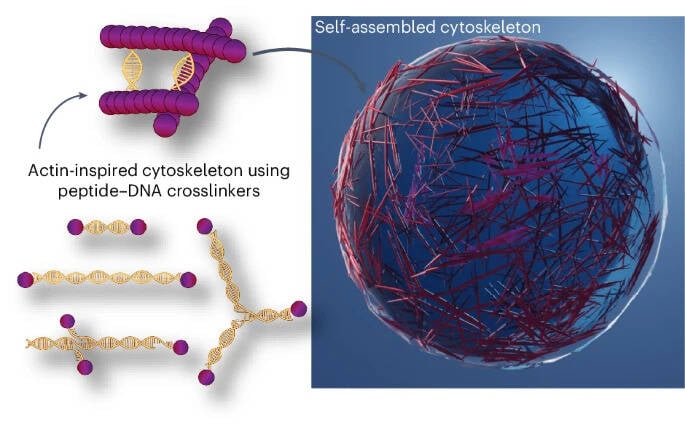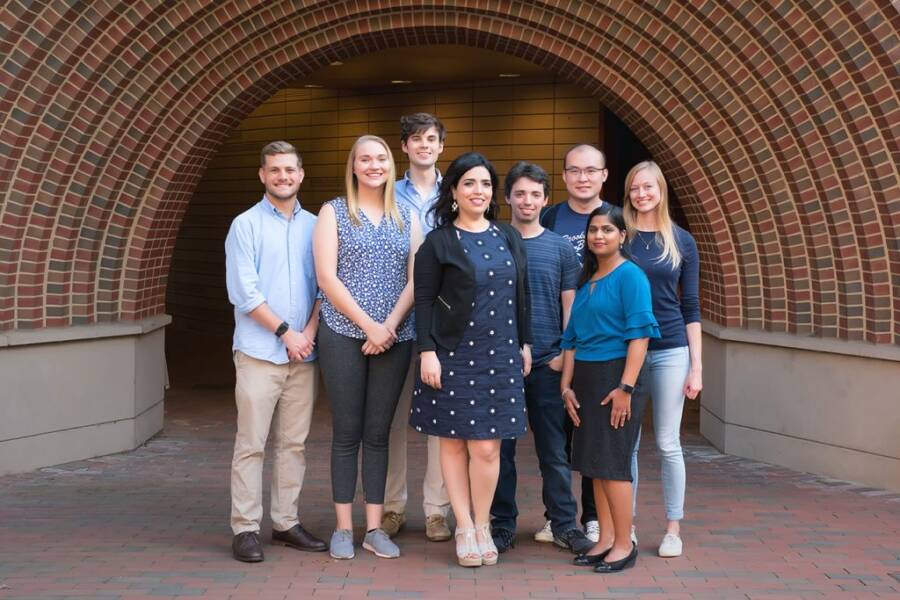Ronit Freeman, a physical sciences researcher at the University of North Carolina at Chapel Hill, has successfully manipulated peptides and repurposed genetic material to create synthetic cells that operate like living ones for the first time.

Daly et. al/UNC-Chapel Hill An example of the cytoskeleton of an artificial cell created using programmable peptide-DNA technology.
Researchers at the University of North Carolina at Chapel Hill have engineered artificial cells to act like live cells using DNA-peptide technology.
The team successfully manipulated peptides and genetic material to form cell cytoskeletons, allowing scientists to change cell behavior by altering DNA.
This artificial cell technology holds promise for application in both the biotech and medical industries.
Creating Artificial Cells With Life-Like Behavior
Ronit Freeman and her team at UNC-Chapel Hill have successfully created artificial cells that act like living cells. The experiment began with the manipulation of DNA and proteins, essential molecules composed of amino acids and peptides.
Proteins make up an organism’s cells and tissues, forming a cell’s cytoskeleton or external structure. A cytoskeleton is flexible and allows a cell to change and react to different stimuli.
Freeman and her team sought to create a cytoskeleton without the use of natural proteins. According to their study published in Nature Chemistry, the scientists used programmable peptide-DNA technology to direct peptides to create cytoskeletons.
Typically, DNA is not found in an organic cytoskeleton, so the researchers’ use of it in their artificial cell trials was novel.
“DNA does not normally appear in a cytoskeleton,” Freeman stated, according to the UNC-Chapel Hill press release. “We reprogrammed sequences of DNA so that it acts as an architectural material, binding the peptides together. Once this programmed material was placed in a droplet of water, the structures took shape.”

UNC-Chapel HillRonit Freeman and her team of researchers.
Researchers note that the DNA is programmable, meaning that a cell can be changed to serve certain purposes or react in specific ways to stimuli. In essence, it can alter the way an organism naturally responds to external pressures, making it revolutionary in the fields of biotechnology and medicine.
What Do The Artificial Cells Mean For Regenerative Medicine?
While living cells are more complex than artificial cells, they are more unpredictably reactive. With the development of artificial cells, researchers exert greater control over how these structures respond in times of stress, including high temperatures.
“The synthetic cells were stable even at 122 degrees Fahrenheit, opening up the possibility of manufacturing cells with extraordinary capabilities in environments normally unsuitable to human life,” Freeman stated in the press release.
At the moment, Freeman and her team are focused on creating cells that can perform specific tasks rather than power whole organisms. Alongside other artificial cell technologies, these cells can be used in cell therapy, drug delivery, and cancer treatment.
Currently, the research team is exploring the ability to alter cell shape using their programmable peptide-DNA technology to enhance cell functionality.
“This research helps us understand what makes life,” Freeman stated in the press release. “This synthetic cell technology will not just enable us to reproduce what nature does, but also make materials that surpass biology.”
After reading about the creation of artificial cells, dive into five diseases with origins that medical experts got completely wrong. Then, read about seven dangerous drugs the FDA should have never approved.





